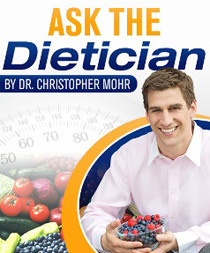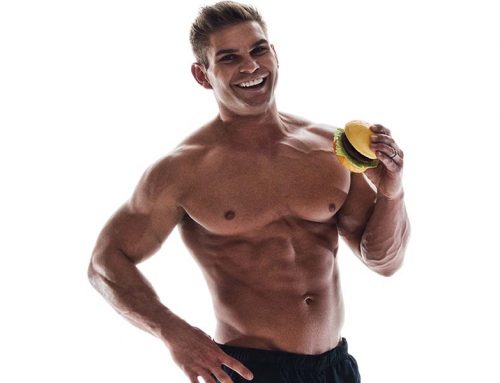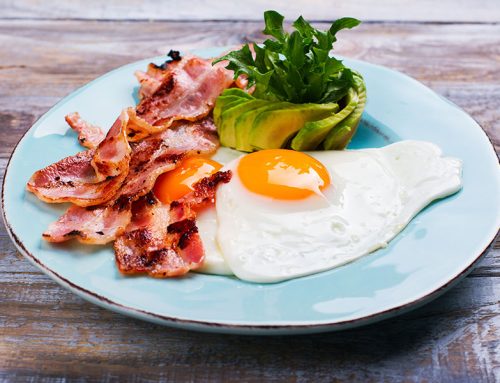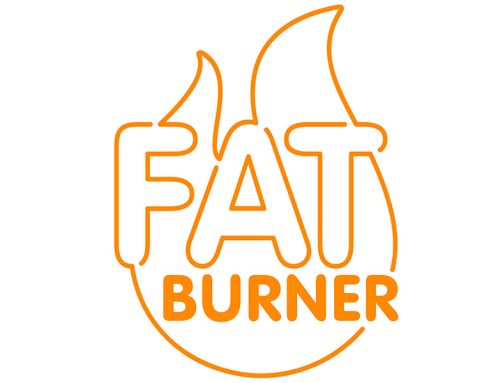If an exercise physiologist, award-winning fitness bootcamp trainer and registered dietician to the pro athletes and stars were asked by his clients, “what are your MOST IMPORTANT tips, EVER, for burning fat and getting in great shape while at the same time, achieving optimal health, wouldn’t you want to know the answers? I would. A man with that mix of credentials has a combination of academic and real-world experience you don’t come across very often. Lucky for you and I, that’s exactly what we have from today’s guest blogger, Chris Mohr, PhD, RD.
For years, Chris has been the go-to guy for our Burn the Fat community anytime we need registered dietician help, and he writes a column at our members-only community, the Burn the Fat Inner Circle. Today, I’m pleased to share his best tips with all our readers.
If you enjoy this info, or as a member of our community if you’ve enjoyed Dr. Chris’s advice in the past, please return the favor by giving him your vote: The Mohr’s were nominated (again) as best bootcamp CLICK HERE TO VOTE FOR DR. CHRIS. Thanks and enjoy the free tips! – Tom Venuto
 Hey everyone, Dr. Chris Mohr here. I’ve been answering questions for years at Tom Venuto’s Burn the Fat Inner Circle in my “Ask the Dietician” column. Usually, they are very specific and have to do with meal plans or health-related food issues.
Hey everyone, Dr. Chris Mohr here. I’ve been answering questions for years at Tom Venuto’s Burn the Fat Inner Circle in my “Ask the Dietician” column. Usually, they are very specific and have to do with meal plans or health-related food issues.
This week, I was asked a bigger, broader question: “Dr. Chris, if you could share a list of tips – your absolute MOST IMPORTANT advice for getting, leaner, fitter and healthier at the same time, that you’ve learned from hands-on work with your clients, combined with your nutrition and exercise science research, what would they be?”
At first I said to myself, “Wow, that’s a loaded question that I could go on about for a long time.” But I tried my best to narrow them down and I came up with a list of 19 of my most important steps to better fitness and better health.
1. Sleep. More. This is by far at the top of the list. You don’t get enough sleep. From burning the candle at both ends, putting in too much time at the office and then trying to get to your daughter’s soccer game, dance recital, or son’s karate practice. You’re exhausted. Oh yeah, and then experts tell you to eat together as a family and you also want to spend time with your spouse all while trying to finish a big project at work and you’re on your email until the wee hours of the night! Power down and get some solid sleep (7-8 hours/night). You’ll do better at all those other things when rested.
2. Eat breakfast. While skipping breakfast or prolonging the morning fast may work for some, for me, for my clients and in most of the scientific literature I’ve read, I believe a high quality breakfast is best. And that’s the key — high quality, meaning some protein, some color (veggies and/or fruit) and fiber. A veggie omelet, for example. A couple hardboiled eggs with a piece of fruit. A homemade protein smoothie. The list can go on, but fueling your body in the AM is best.
3. Power down. You may be physically present with those who matter, but being mentally present is most important. Set deliberate “no electronics” time each night with your family and actually talk. To real people. It’s amazing.
4. Start your day smarter. Rather than immediately checking your IPhone as soon as your eyes open, try a new routine. Maybe pick up a magazine and read. Take a few extra minutes to play with your kids. Or spend 5 extra minutes making a quality breakfast. Down time is necessary and will boost your brain function.
5. Move. More. Over the last few years, I’ve seen “experts” suggest cardio is bad. Cardio isn’t bad. Though slow cardio is not the most efficient way to lose fat, any and all movement is excellent and necessary. So in addition to your sprints or higher intensity short duration training, add general movement too. Maybe it’s walking, cycling, playing tennis or swimming – whatever you love – do it.
6. Eat protein more frequently. While I surely think people can benefit from eating more protein as a whole, at least eating it more frequently is a start. As of now, most eat the majority of protein at night. But it would be better to spread intake more evenly throughout the day. Include a fairly equal amount with all meals and snacks. Eggs, nuts, cottage cheese, fish, chicken, turkey, Greek yogurt, protein shakes — mix it up, just be sure to eat it frequently!
7. Eat Your 3’s. Our daughters take fish oil daily — we call it their “3’s” for (omega 3 fats). They also eat fish regularly. With heart disease the #1 killer of men (and women) in America, eating more fish or replacing other protein sources with fish is a wise, wise idea.
8. Pick up heavy things and put them down. As we age, we all can lose muscle mass – around 1% per year after age 30! Combining rule #8, along with lifting weights, will surely help prevent or reduce that normal loss. Use it.
9. Eat water. Watermelon, cucumbers, greens, melons and really a lot of fruits and veggies are more than 90% water. That’s a lot of nutrient dense volume for very few calories. In other words, these foods fill you up without filling you out.
10. Drink your water too. Along with #9 above, drinking water is smart too. I recently started a habit that helps me feel much better — every morning, the first thing I do after getting out of bed, is fill up a large glass of ice water and drink it before coffee, tea or eating anything. It’s invigorating and gets my day started right. Try it.
11. Get in the kitchen (to cook, not just eat)! The more you cook, the better you look. Having lunch with a friend the other day, the topic of men cooking came up … she too is a dietitian and we talked about how men (and women) are moving further and further away from cooking. It’s sad, but I 100% believe this lack of knowledge and skill will single handily destroy our society. Fast paced. Take out. Fast food. All are fine on occasion. None are fine all the time. Get in the kitchen and be a student. Cooking is an essential life skill.
12. Eat nuts. Nuts are one of the healthiest foods available – pistachios, walnuts, almonds, Brazil nuts – all are amazing for you in their own, respective ways. Some data suggests two – 1 oz servings per day can even help with weight loss. Outside of that, they’re portable, convenient, and not perishable so travel well.
13. Eat a high protein breakfast. Data shows we’re not doing well in this department, by eating an average of just 10 grams of protein for breakfast, about 15 at lunch and around 65 at dinner. But protein research has shown that eating around 30 grams of protein at breakfast has such a powerful effect, you’ll voluntarily have a 200 calorie decrease in the evening meal. That can mean fat loss or at least maintenance, but it also means your muscles are happier and you can maintain muscle mass. A win win. Consider a little steak and eggs, cottage cheese, Greek yogurt or start your day with a whey protein smoothie.
14. Color Your Diet. I’m not talking Froot Loops or Fruity Pebbles. I’m talking veggies and fruit. For every 2 veggies, eat 1 fruit and aim to include some with each meal and snack.
15. Time for an oil change. The fat in your diet can have a huge impact on your health. In addition to adding the 3‘s mentioned above, the fats you use in cooking are important. Replace the junky fats – soybean oil, vegetable oil, corn oil, margarine – and swap them out with olive oil, canola oil, coconut oil, avocado oil when cooking or adding to salad. I personally love an egg omelet, with a handful of arugula on top, drizzled with a bit of olive oil and a pinch of salt. Mangia!
16. Finish Just 80% of your plate. I’m out to dinner with friends the other night at a fantastic steak house in Chicago. The smallest steak on the menu? 12 oz (3/4 of a pound). The smallest. Not counting the sides, that’s a bit more than anyone needs in one sitting. That may be a little extreme, but in general we all eat too much when served at a restaurant or serve ourselves too much when at home.
17. Eat Grains, but Use them as the “Condiment.” Grains are not the enemy when you choose high fiber grains. But don’t build the meal around them. Instead, fill your plate with veggies (2 handfuls) and protein (2 handfuls) as the base, then include just 1 handful of grains.
18. Beans, Beans, They’re Good For Your Heart. Yeah, yeah — you’ve heard the rhyme. Beans are awesome. Eat them. Try this – Egg Stir Fry. Grab some leftover steak from the night before, slice it thin, mix it with 2 whole eggs, a handful of spinach, 1/2 cup of black beans and cook. I like it with some fresh herbs, too, but we don’t have to get carried away. Cook this up, top it with salsa. Voila. An awesome, high protein breakfast (or anytime meal).
19. Gobble Up Berries. Tiny little berries are one of the most powerful, heart disease fighting foods available. Raspberries, blueberries, strawberries, blackberries – you name ‘em, you should eat them. These are concentrated little nutrient packed powerhouses. Fresh and frozen are both great, so mix them up in shakes, cottage cheese, Greek yogurt – or just by the handful.
Remember to cast your vote for Dr. Chris – “Best Bootcamp”: CLICK HERE TO VOTE
Which of these tips have you found had the biggest impact on your fat loss and health results? Please share by leaving your thoughts in the comments below.
About the Author

He has Bachelor and Master of Science degrees in Nutrition from The Pennsylvania State University and University of Massachusetts, respectively. He earned his PhD in exercise physiology from the University of Pittsburgh and is a Registered Dietitian and Board Certified Specialist in Sports Dietetics.
Dr. Mohr is known as the nutrition professional that other fitness professionals turn to and he is also a celebrity dietician, including consulting with LL Cool J on “LL Cool J’s Platinum Workout.”






You say to include fruit with each meal/between meal, but I keep getting lectured to stop eating fruit around mid-afternoon, that it’s got too much sugar (fructose) to eat late. May I have your take on this?
Janet there is no reason to stop eating fruit mid afternoon, or stop eating fruit in general. My suspicion about this advice is that it may have come from “frutcose alarmists” who very often confuse naturally occuring fructose in whole fruit and high fructose corn syrup which are completely different animals. Learn more about the benefits of fruit here:
THE FINAL WORD ON FRUIT, FRUCTOSE AND FAT LOSS:
https://www.burnthefatblog.com/archives/2008/10/the-final-word-on-fruit-fructose-and-fat-loss-audio.php
I have found that eating a high protein breakfast with very little carbs has been a tremendous help in keeping me from craving bad carbs, like chips and pretzles, for the rest of the day. It also seems to help with late night cravings.
I agree with everything except canola oil. Are you kidding???? I believe its a machine lubricant, and I don’t mean the body.
Hi sara. Dr. Chris has addressed this before. See:
http://www.mohrresults.com/mohr-results-weight-loss-2/canola-oil-controversy-isnt-over/
EYE MUST CONFESS NOT BUILDING MY MEEL AROUND THEM IS SOUND ADVICE IF YOU ASK *M.E.E* (:
Hello
In response to Kathy, the presence of protein at breakfast will limit the rise in blood sugar in the beginning of the day. This is very interesting and especially essential for diabetics
Jean Philippe
Yes, there is also some very good data from more than one lab about the appetite-suppressing or satiating quality of protein and researchers have studied it enough to know it works on a hormonal level (increasing levels of satiety hormones). Which suggests eating protein at breakfast helps control appetite during the day, and explains why.
These are some great health tips, I’ve found myself following some them without knowing of their benefits and importance, this high protein breakfast thing is very interesting, its so unusual compared to the common high carb breakfast…Im going to give a try though.
Hi guys, Why are you suggesting we swap out Bad oils with canola oil?? That stuff is poisonous and a GMO oil from rapeseed!!!
vijaya – did you follow the link to the article I posted by dr chris mohr? http://www.mohrresults.com/mohr-results-weight-loss-2/canola-oil-controversy-isnt-over/
Its possible you may be right. However, do you have any evidence? If you would post your evidence that this oil is “poisonous”, only referring to pub-med indexed peer-reviewed studies, I would be glad to consider the data and revise or update what I publish on my site, as im sure dr. mohr would. Do not link to alarmist health websites, please. This is pub med: http://www.ncbi.nlm.nih.gov/pubmed As our contributing author mike howard wrote – “pub med knows more than your guru”
Tank you very much for these tips it really inspire me to write more about this field, i mean weight loss, i like tip number 13…
I’m confused by the math re: high-protein breakfasts. Eating 30 grams of protein for breakfast may result in a 200-calorie decrease at dinner time, but doesn’t ingesting 30 grams of protein require you to consume another 200 calories (or more) at breakfast? For example, three large eggs = 210 calories and 18 grams of protein. One scoop of Myofusion whey powder = 147 calories and 25 grams of protein.